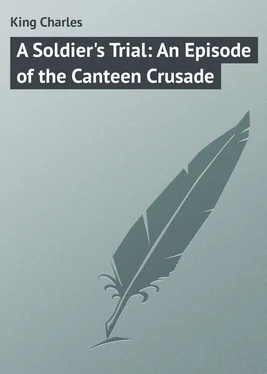Charles King - A Soldier's Trial - An Episode of the Canteen Crusade
Здесь есть возможность читать онлайн «Charles King - A Soldier's Trial - An Episode of the Canteen Crusade» — ознакомительный отрывок электронной книги совершенно бесплатно, а после прочтения отрывка купить полную версию. В некоторых случаях можно слушать аудио, скачать через торрент в формате fb2 и присутствует краткое содержание. Издательство: Иностранный паблик, Жанр: foreign_prose, на английском языке. Описание произведения, (предисловие) а так же отзывы посетителей доступны на портале библиотеки ЛибКат.
- Название:A Soldier's Trial: An Episode of the Canteen Crusade
- Автор:
- Издательство:Иностранный паблик
- Жанр:
- Год:неизвестен
- ISBN:нет данных
- Рейтинг книги:4 / 5. Голосов: 1
-
Избранное:Добавить в избранное
- Отзывы:
-
Ваша оценка:
- 80
- 1
- 2
- 3
- 4
- 5
A Soldier's Trial: An Episode of the Canteen Crusade: краткое содержание, описание и аннотация
Предлагаем к чтению аннотацию, описание, краткое содержание или предисловие (зависит от того, что написал сам автор книги «A Soldier's Trial: An Episode of the Canteen Crusade»). Если вы не нашли необходимую информацию о книге — напишите в комментариях, мы постараемся отыскать её.
A Soldier's Trial: An Episode of the Canteen Crusade — читать онлайн ознакомительный отрывок
Ниже представлен текст книги, разбитый по страницам. Система сохранения места последней прочитанной страницы, позволяет с удобством читать онлайн бесплатно книгу «A Soldier's Trial: An Episode of the Canteen Crusade», без необходимости каждый раз заново искать на чём Вы остановились. Поставьте закладку, и сможете в любой момент перейти на страницу, на которой закончили чтение.
Интервал:
Закладка:
Ray was not in his stateroom when Foster bustled thither to inquire. Ray had returned some hours before, said the ship's official on duty. Ray was not found, however, until nearly four bells, when Foster, who had smoked too much to feel sleepy and wished to "stay up and see Vesuvius, anyhow," made an extended inspection of the silent deck. Foster had taken it amiss that Ray should seem so downhearted and be so uncompanionable. Foster felt that the time had come when, in the absence of Sandy's own, he (Foster) should assume paternal rights, or at least those of elder brother, and take the youngster to task. Here and there about the big ship he found, in knots of two or three, silent or conversing in low tone, comrades of the commissioned list or of the ranks, unwilling to seek their berths so long as so gorgeous a panorama lasted. These were ranged along the starboard side, where best they could study that superb sweep of shore line, of light and shadow, of slope and mountain, of curving strand – white, flashing in the moonbeams, of twinkling villages low-lying, of distant, rock-ribbed isles, but among these worshipers there was no Ray.
It was over on the other – the dark, the port – side, and all alone, sprawled in a steamer chair he had lugged to the upper deck and the shadow of the big boat, that Foster came upon the lad. His field glasses were in his hand; his eyes fixed dreamily upon the dwindling, diminishing night lights of the westward suburbs, and Foster hailed brusquely. It was time to jar the boy out of his mooning:
"Hello, Sandy! Where on earth have you been all night?"
"Nowhere," was the short reply.
"Where on sea then, if you will be captious?"
"Oh, admiring scenery," and Sandy yawned suggestively.
"Scenery is all on t'other side, man! Nothing here but ships and shore lights."
"Well – that's what I'm – looking at."
Foster turned sulkily. He disliked being "stood off" by anybody, especially a youngster. Dimly in the soft moonlight the sleeping city lay outspread before him. Standing on the rail, grasping a stanchion, he could see, save where the charthouse and huge funnel interposed, the entire sweep from Posilipo at the west around almost to Sorrento. Ray, seated under the shadow of the long boat, could see only from Posilipo to a low-lying cluster of lights almost at the water's edge. That then was the Piazza Umberto, and those few twinkling, starlike sparkles to the left, dancing so merrily on the intervening wave – those were from some still open casements at the Grand. Then Foster saw what Sandy Ray was looking for, and turned and left him.
At dawn they were weighing anchor, but the big ship had not yet swung her nose to the west when Foster again appeared on the dripping deck and again found Ray almost at the same spot. Some of the same lights, a very few, were still faintly to be seen to the west of the Piazza, and Ray's signal glasses were lifted to his eyes. Aloft the sentinel stars were paling, their night watch ended. Ashore, along the quays and basin and about the Dogana, the lantern lights told of the stir of coming day and departing shipping. Beyond the heavy smoke all about the lone and threatening mountain, the skies were taking on a rose hue of their own that dulled the glow of the sluggish streams rolling ever down those scarred and desolate slopes. Near by in silvery chime ship after ship announced the passing of the night hours, the birth of the infant day, and a long, light-girdled shape, floating easily close at hand on the swelling tide, slowly changed from shadowy black to gray, from gray to violet, and finally – as the still invisible sun peered long leagues away beyond the Italian mountains, beyond the Adriatic wave, above the dim Ægean shore, and sent his flashing signals through the upper ether – from cream to snowy white, there lay the Hohenzollern , "all a taunto and impatient" for her westward voyage for "Gib," for the Azores, for home, and they of the bulkier, heavier transport envied possibly the lithe and lissome build of the famous pleasure craft, once the pride of the old German Lloyds. She might follow in the run past Ischia and Sicily. She would lead far in the chase for Sandy Hook.
"Been up all night, Sandy?" hailed Foster sharply, believing it high time to break in upon these romantic moonings.
"No," said the young soldier slowly. "I've been – down."
"Poor boy," thought Foster, as he turned away. "He looks it! Poor, nonsensical, damn little fool!"
Yet Foster was not so very big, so very wise, so very safe and sure. He had yet to know for himself much that Ray knew now.
CHAPTER IV
"SHE IS COMING HERE!"
The valley of the Minneconjou was looking its loveliest in the joyous sunshine of mid-May. The post had been enlarged to meet the needs of the increasing garrison. A colonel of infantry had been sent to assume command, there being now two of his battalions at the station and only one squadron, of four troops, of Ray's old regiment, the – th Cavalry. At any moment our friend of that name and many years, now become lieutenant-colonel in his own right, could expect orders for the Philippines, and he was ready as ever, though there were just a few reasons why he hated to go. It had been decided that Marion, his wife, hitherto his almost inseparable companion, should not venture to Manila. The detail at most would not exceed two years. It might cover only one, for it was certain that, with the coming enlargement of the army, Ray would soon be promoted to the full rank of colonel, and that would probably bring him home again, for, as things had been going in Samar and Mindanao, colonels were in that sort of campaigning about as useful as most of them in church. Keen young captains and lieutenants were in demand. Field officers, so-called, were of less account in the field than in fortified places. Occasionally a sizable column – a major's command perhaps – would push forth into the jungle, where it speedily had to split up into small detachments, probing in single file, and in pursuit of scattering bands of ladrones or banditti, the bamboo or the mountain trail. Moreover, much of the vim and spirit had been taken out of the soldiery, officers and men, old and young, by the fate of the more daring and energetic of their number, who had fallen victims, not to lance or bullet of lurking foe at the front, but rather "the slings and arrows of outrageous fortune" at the rear. A powerful party at home had shown far more concern over the alleged ill-treatment of the few insurgent bands than their actual treachery to our men-at-arms. Officers and men listened in silence to the public rebukes and sentences administered to the leaders who had shed their gloves and fought the insurrecto with weapons far more effective, yet infinitely less deadly, than fire and steel. Officers and men in silence set forth upon their next ordered expedition, and in silence returned and announced the result – practically nothing. Elusive and flitting little bands of native warriors, vanishing like shadows among the thickets, were not to be trapped by the methods prescribed for dealing with an army arrayed in front of Washington. "Don't come unless you have to," wrote Major Blake from the hospital at Manila to Billy Ray at Minneconjou. "The courts-martial of Hill and Dale and Langham have taken the heart out of our fellows. The young officers say they dare not go out for fear they might do some damage somewhere."
So Ray, who had fought Indians all over the West for many a year – sometimes, it is true, coming in for a Puritanical scorching from press and pulpit in far New England, where, two hundred years ago, with prayerful zest our forefathers burned witches at the stake and put Pequots to the sword – now found himself shrinking from the task of tackling savages with gloves who treated men without mercy. Marion, as has been said, was not to accompany him to the Islands and be near to counsel and to comfort. She was not too well now, and had had many an anxiety. Billy, Junior, when he should have been studying for West Point, had been spooning over a pretty girl not yet in long dresses, and Sandy, their firstborn, the soldier boy, had come home from the Islands wounded in body and soul. The scar of the bullet would not be long healing, but the sting of that other shock and sorrow, who could say what that might yet import? for Sandy would not speak of it. Sandy would not so much as refer to his brief dream of bliss and the girl that inspired it. Sandy had come to them at Minneconjou to recuperate, detached from his own regiment "for such light duty as he might be able to perform" with his father's squadron of the old – th. Sandy was a sad and silent man. "Let him alone to beat it out in time," said the soldier-father. "It is the only way." But Marion's mother heart yearned over her boy and his wordless sorrowing. He must have loved that beautiful but unprincipled creature with all his fervent young heart.
Читать дальшеИнтервал:
Закладка:
Похожие книги на «A Soldier's Trial: An Episode of the Canteen Crusade»
Представляем Вашему вниманию похожие книги на «A Soldier's Trial: An Episode of the Canteen Crusade» списком для выбора. Мы отобрали схожую по названию и смыслу литературу в надежде предоставить читателям больше вариантов отыскать новые, интересные, ещё непрочитанные произведения.
Обсуждение, отзывы о книге «A Soldier's Trial: An Episode of the Canteen Crusade» и просто собственные мнения читателей. Оставьте ваши комментарии, напишите, что Вы думаете о произведении, его смысле или главных героях. Укажите что конкретно понравилось, а что нет, и почему Вы так считаете.












